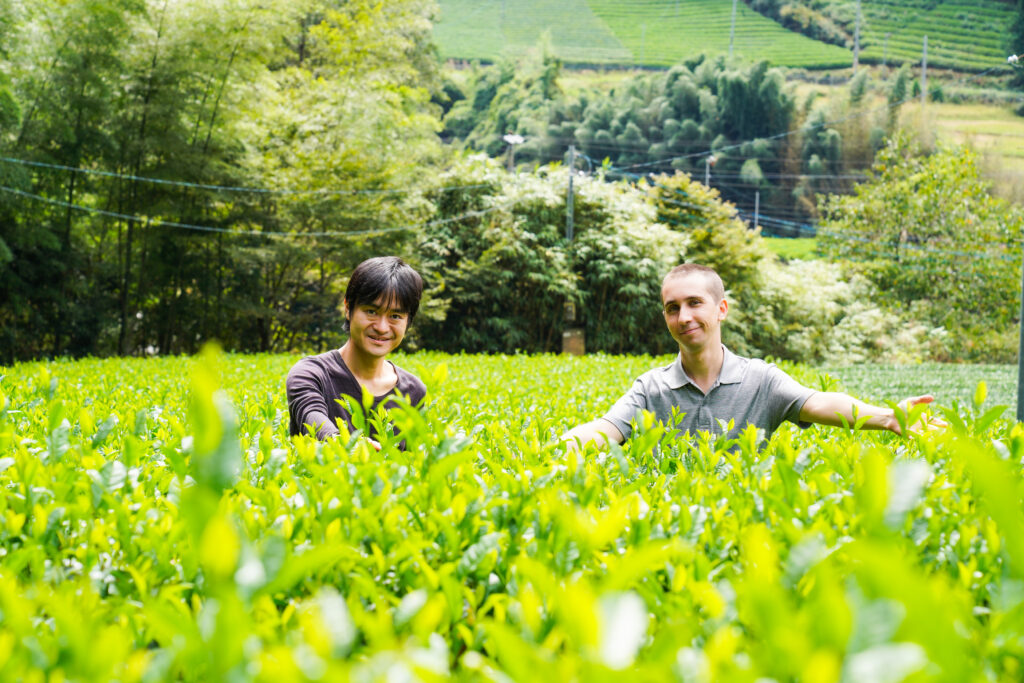Kyoto has long been renowned for its tea. For centuries, people from all walks of life, from emperors to peasants, have enjoyed tea with their meals, and monks have sipped matcha green tea between daily spiritual exercises to awaken their senses. Tea is a must-try for any visitor to Kyoto. To fully experience this timeless beverage, you should venture to the Kyoto Tea Country region. Uji City, known for its high quality Uji Tea including world-famous matcha, is just south of Kyoto City. Wazuka Town, a major producer of Uji Tea, offering breathtaking tea field scenery, is located a little further south.
Inspiration
Experience the World of Tea with All Five Senses in “Kyoto Tea Country”
2021.12.27
Wazuka: The Heartland of Uji Tea Production
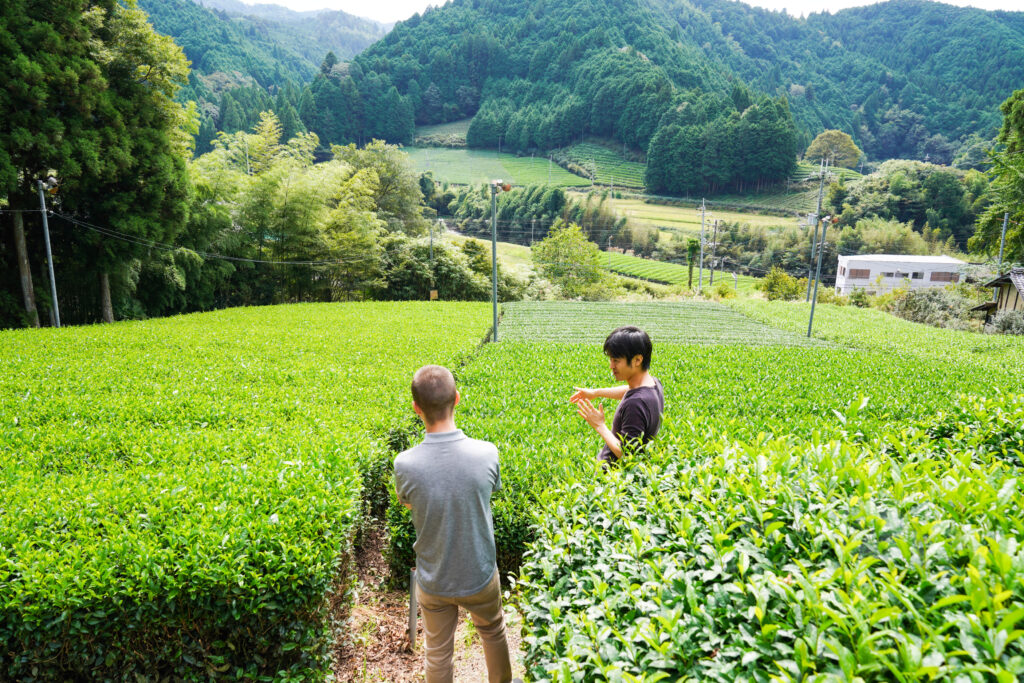
Located in an area surrounded by mountains, with a clear stream flowing through it, scattered settlements create old-fashioned Japanese satoyama (cultivated countryside) landscapes. This is Wazuka. The climate is said to be ideal for tea production, with significant temperature variations between day and night, and morning fog that shields the delicate leaves from direct sunlight. Teas from Wazuka, nurtured in this environment, have great umami (delicious savory tastes) and aromas. Their high quality has been a delight to many people for a long time.
Wazuka has captivated visitors from both Japan and abroad, yet remains an undiscovered treasure with its beauty and authentic tea. It’s an ideal destination for travelers who hope to avoid the crowds and take in the iconic scenery of tea plantations spread gracefully on the mountain slopes. Enjoy strolling through the area. Take beautiful pictures. Remember that you are not permitted to enter the tea plantations, as they are the private property of the farmers. To experience them up close, guided tours are available.
・Tea Farm Tour with D:matcha Kyoto
(The following information about D:matcha Kyoto was as of December 27, 2021.)
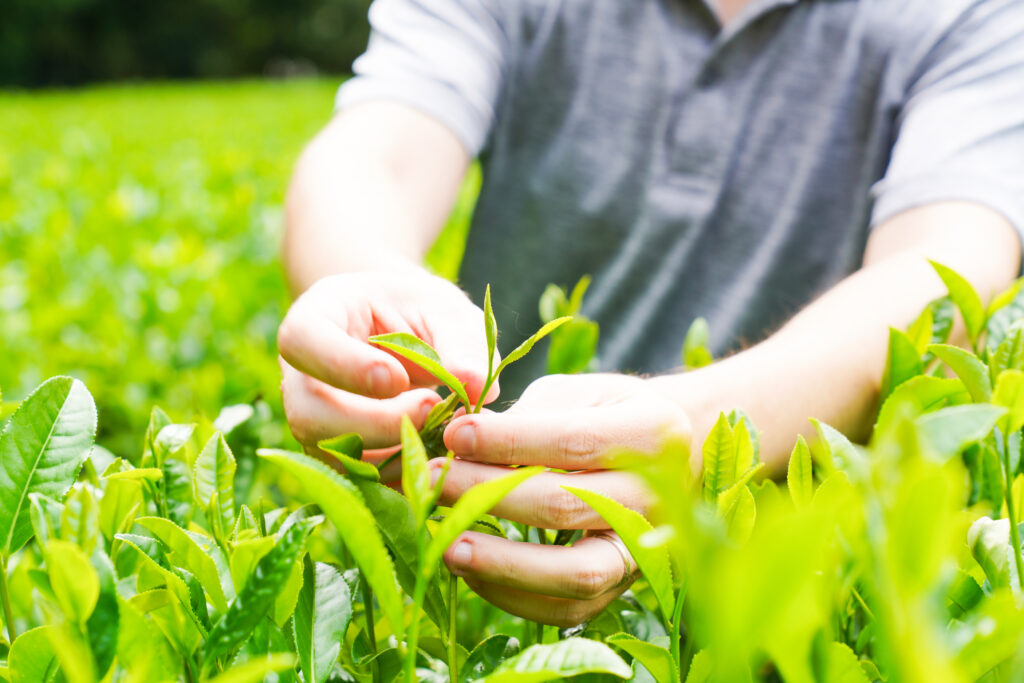
For a great experience at a tea plantation in Wazuka, look no further than Daiki Tanaka, a local organic tea farmer. He runs D:matcha Kyoto, a tea business aimed at playing a role in revitalizing the region, as well as spreading the culture of Japanese tea farming to new audiences. As one means, he introduces his own tea plantations to foreign tourists through an informative half-day tour. In fluent English, the charismatic farmer, Mr. Tanaka imparts his knowledge about agriculture and tea in a friendly and easy-to-understand way.


The tour takes you deep into the heart of Wazuka. You’ll climb mossy stone steps through ancient cedar trees to a small Shinto (a Japanese religion) shrine. This is akin to entering a more tranquil world dominated by nature. The tea plantations lie next to the shrine. You’ll walk among the tea trees that line up in tight rows. Being deep inside the vibrant tea fields is an invigorating experience. Mr. Tanaka will show you how to hand-pick young buds, as has been done in Wazuka for centuries.
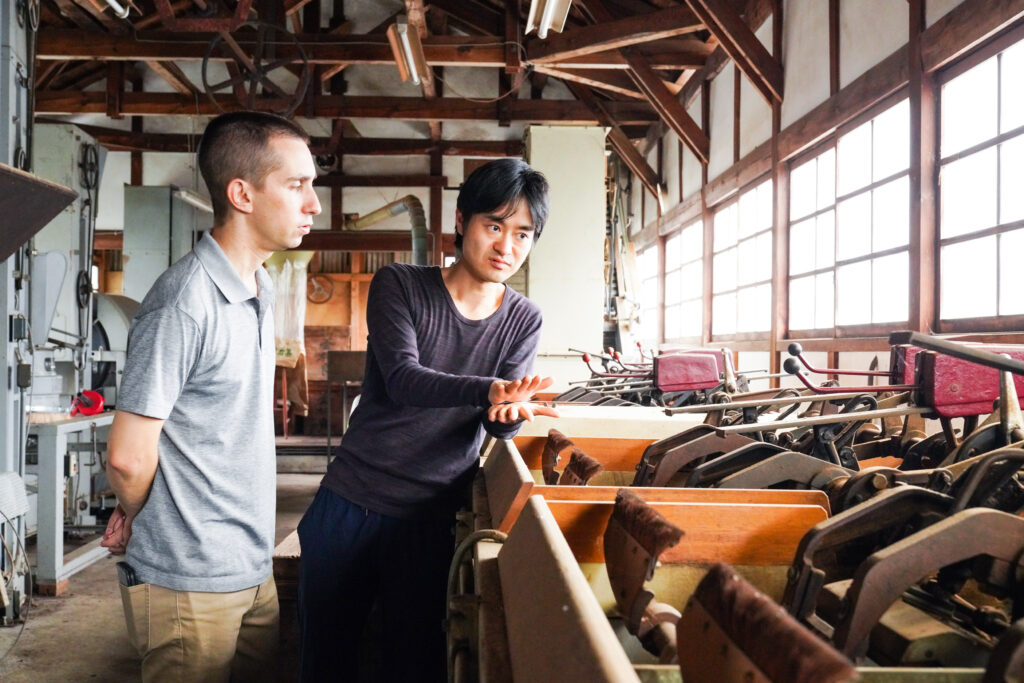
The tea is picked and processed on the same day, so it makes sense that the next stop on his tour is the tea factory. Though only used during the harvest seasons, the factory, which sits in an old building of clay and wood, allows you to gain a deeper understanding of the work that goes into production. The machinery is surprisingly retro and has a wonderful nostalgic feel to it.
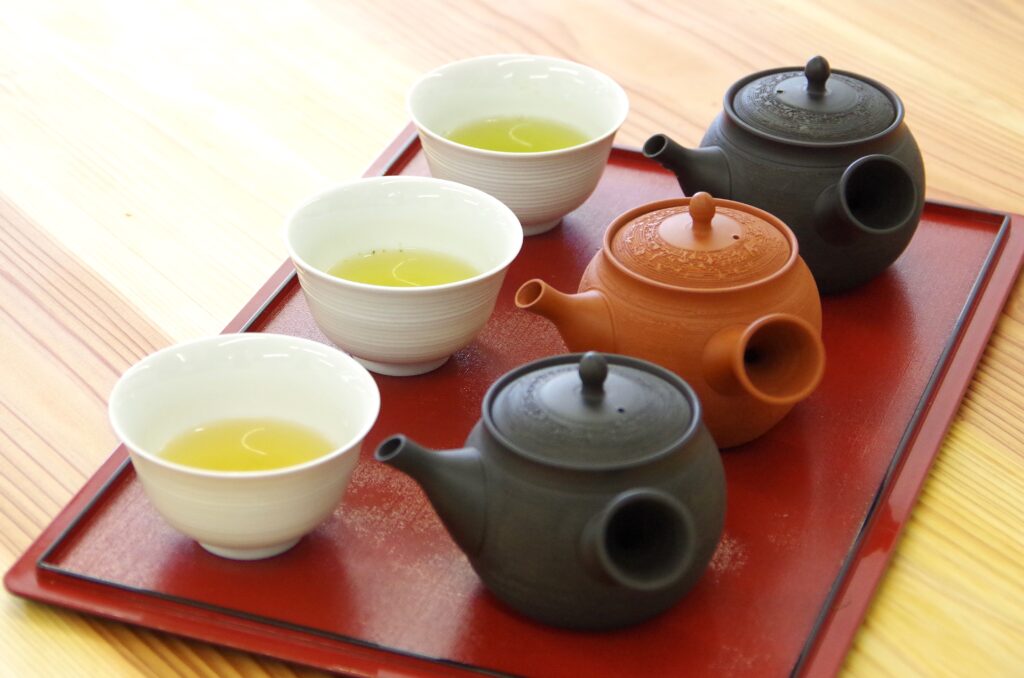
Another part of Mr. Tanaka’s tea education vision is the D:matcha Kyoto Cafe & Kitchen in central Wazuka. This is where lunch is served to tour guests upon returning from the factory. The menu features dishes seasoned with tea, and the tea leaves picked from the field earlier are fried into tempura. It’s a delicious homestyle meal that captures the essence of freshness and vitality of Wazuka tea.

After lunch, a tea tasting is held where various cultivars of tea are presented. Mr. Tanaka explains how these single origin teas each have their own terroir, a flavor profile shaped by the growing conditions. This is immediately evident in the trying of sencha (one of the most commonly drunk Japanese teas) and matcha. It’s a thrill to savor the teas that have been grown with such care and thought, and Mr. Tanaka succeeds at making the complex world of Japanese tea much more approachable through his engaging tour and tasting experience.
Tea Tours at D:matcha Kyoto are held daily from 9:30am to 1:30pm, except Wednesdays and Thursdays. The fee is 10,000 yen per person. Online reservation required. You can request a pickup from JR Kamo Station.

D:matcha Kyoto
D:matcha Kyoto offers amazing tea experiences. The Tea Farm Tour & Tasting is available in both Japanese and English. First, you can learn about various aspects of tea, such as its types and productio …
・Additional Suggestions to Enhance Your Wazuka Experience
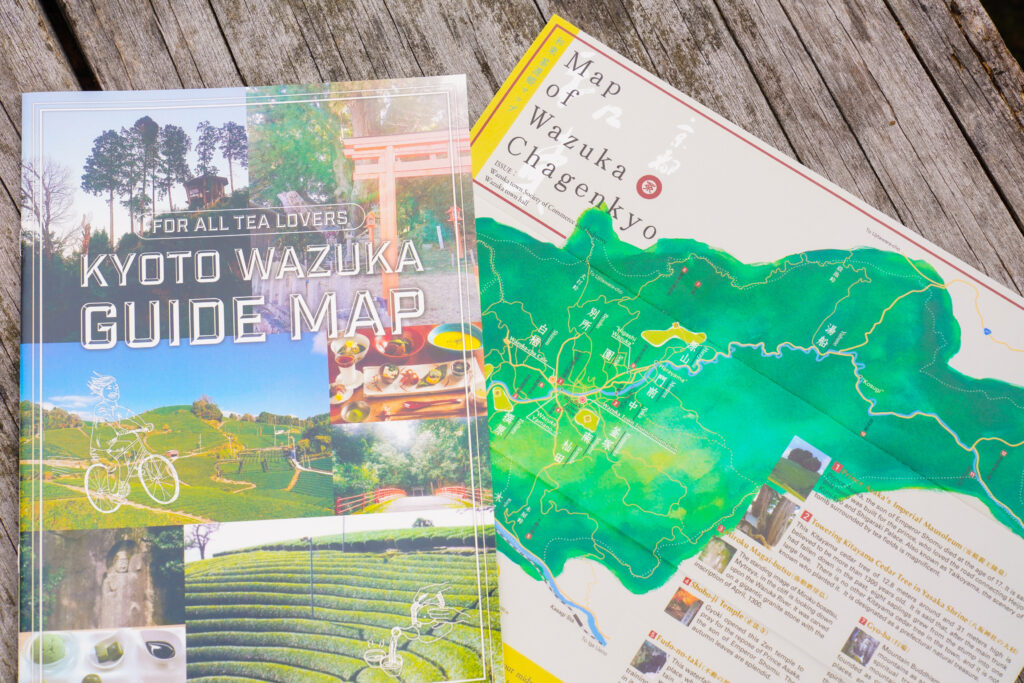
There is Wazukacha Cafe near the town office and the Wazuka-yamanoie bus stop. You can get tourist maps and information here. The inviting cafe offers sweets, drinks, and more, made with tea from Wazuka. Additionally, they have Tenku Cafe, providing a private retreat in an elevated location. From there, you can enjoy a panoramic view of Wazuka while savoring delicious tea, sweets, and so on. At the shop, there is a wide selection of about 140 teas, locally made products, and more. You can also find single-origin teas grown in the town, which bring you experiences of unique character of each farm’s harvest that year.
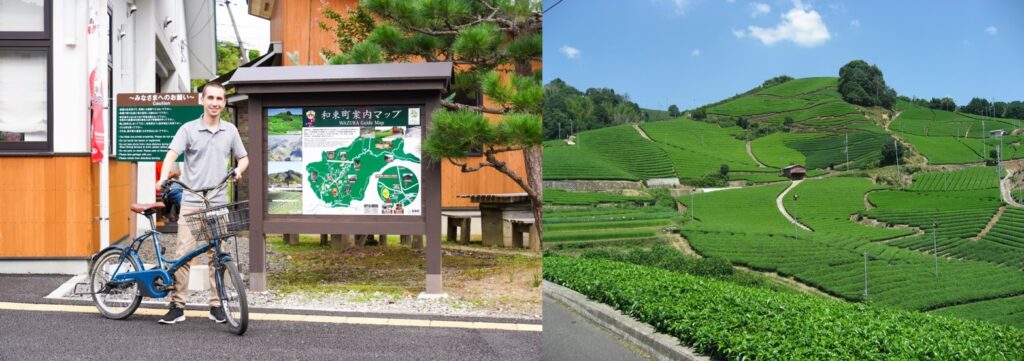
Also, electric bicycles are available for rent. No matter when you visit, cycling through the town, surrounded by nature with breathtaking tea plantation scenery, is a truly enjoyable experience. The e-bike allows easy access to the must-visit Shirasu and Ishitera Tea Plantations, one of the most famous spots in Wazuka, where you can enjoy stunning scenery.
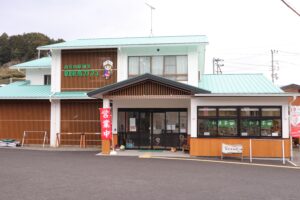
Wazukacha Cafe
Wazukacha Cafe, in Wazuka Town, is located near the town office and the Wazuka-yamanoie bus stop. You can get tourist maps and information here, making it a great first stop on your trip. The inviting …
Uji: The Iconic Home of Tea Culture
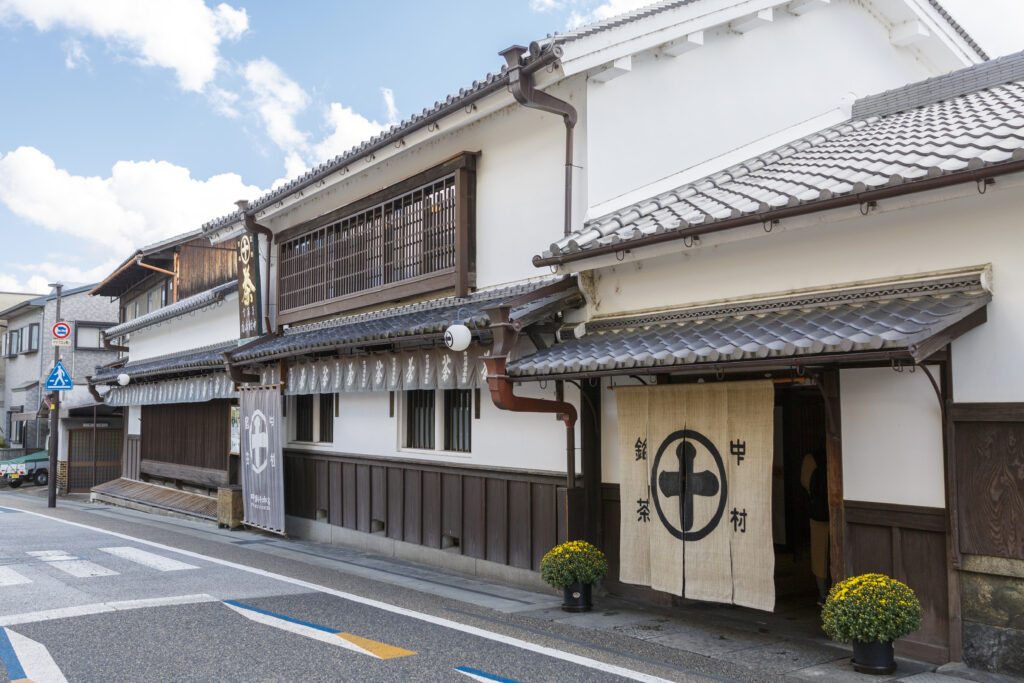
Located just south of Kyoto City, the city of Uji stands as the undisputed center of Japanese tea culture. This area flourished as a villa resort for aristocrats of Heian-kyō (the ancient capital located in Kyoto) in the Heian Period (794-1185). Then, Uji gained prominence in the Muromachi Period (around 1336-1573) as the exceptional quality of Uji tea spread throughout Japan. Also, in the 16th century, Uji saw the development of the method of shade cultivation, which gave birth to matcha green tea. Furthermore, in the Edo Period (from 1603 to around 1868), gyokuro, a luxury green tea, was born in Uji, using the shade-grown leaves but processed differently from matcha. Since the Meiji Era (1868-1912), Uji tea has been enjoyed by even more people by utilizing sophisticated techniques in processing and blending tea leaves. Today, Uji tea, especially matcha, is enjoyed all over the world.
Uji still echoes with history. There are traditional chashitsu (houses for tea ceremony), and Ujibashi Street preserves old buildings including long-established shops of tea farmers and tea manufacturers. Uji has a different kind of charm than Wazuka, the center of tea production.
It’s only a twenty-minute train ride from Kyoto Station to get there. Quaint Japanese scenery, historical sites, and delicious tea are waiting for you. With a variety of cafes, restaurants and shops, from traditional to modern, you’ll find numerous opportunities to savor the region’s renowned teas.
・Taiho-an: A Bowl of Tradition
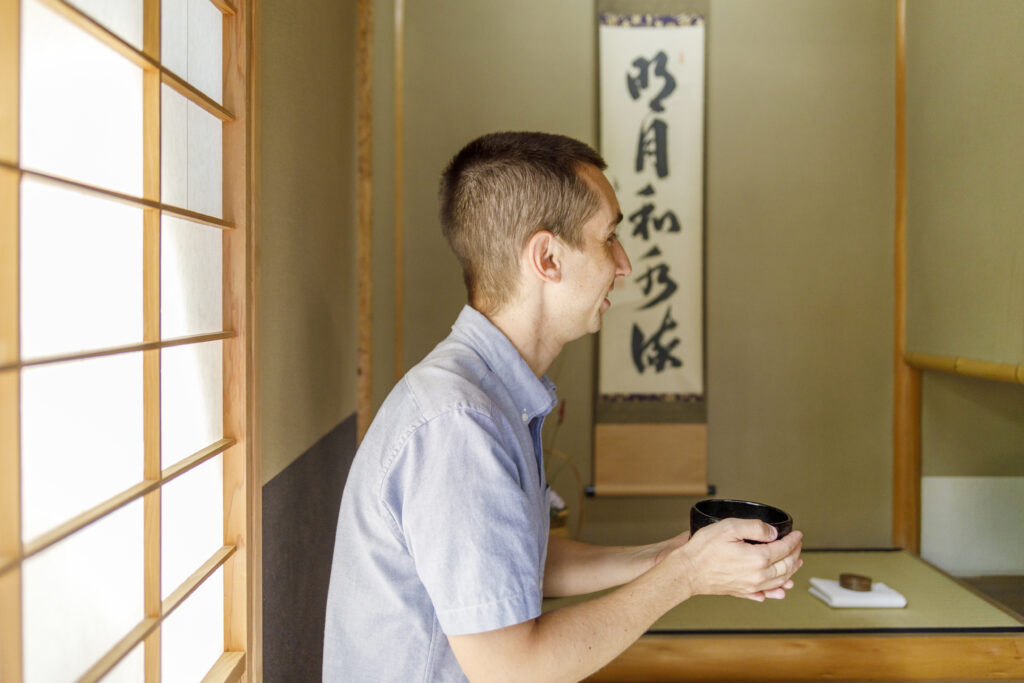
A traditional matcha ceremony is a popular experience among foreign tourists visiting Japan. For an enjoyable ceremony in an authentic setting, be sure to visit Taiho-an (Uji City Municipal Tea Ceremony House) on the west bank of the Uji River. In addition to delicious tea, a skillful teacher from Uji City Tea Ceremony Association will guide you through the ceremony in an easy-to-understand and engaging manner.


Taiho-an’s tea rooms are nestled within a small, elegant garden with moss and stepping stones, showcasing a captivating example of centuries of Japanese designs. In addition to traditional tea ceremonies sitting on tatami (a traditional Japanese mat), Taiho-an also provides tatami benches, allowing you to comfortably enjoy the world of matcha even if you are not accustomed to seiza (a formal sitting way in Japan). A bowl of calming tea in the quiet space filled with the Japanese spirit nurtured by history will soothe your heart. As you experience the beauty and depth of the tea culture, fatigue of the day of sightseeing will melt away.
Stepping into the tea room, you’ll be greeted by the hosts. The ceremony begins with a Japanese sweet, followed by the serving of matcha prepared in front of you. The tea has a pleasant aroma and a mellow, savory flavor. The true pleasure of a traditional tea ceremony is immersing yourself in the moment and appreciating every aspect of the experience through your senses. The whisper of the boiling water, the soft light filtering through the shoji (traditional Japanese sliding screens), the texture of the tea bowl, the beauty of the kakejiku (hanging scroll) and flowers arranged tastefully, and the hosts’ gracious hospitality – everything will allow you to be fully present with a lot of sensitivity and a feeling of gratitude.


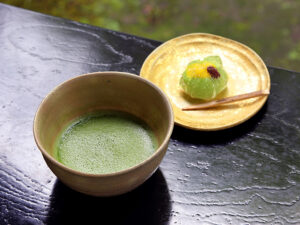
Learn the Etiquette of Japanese Tea Ceremonies (at Taiho-an)
At Uji City Municipal Tea Ceremony House, Taiho-an, you can experience authentic Uji tea accompanied by a seasonal Japanese sweet. If you don’t know anything about Japanese tea ceremonies, there’s no …
・Nakamura Tokichi Honten: Sweet Treat of Authentic Tea
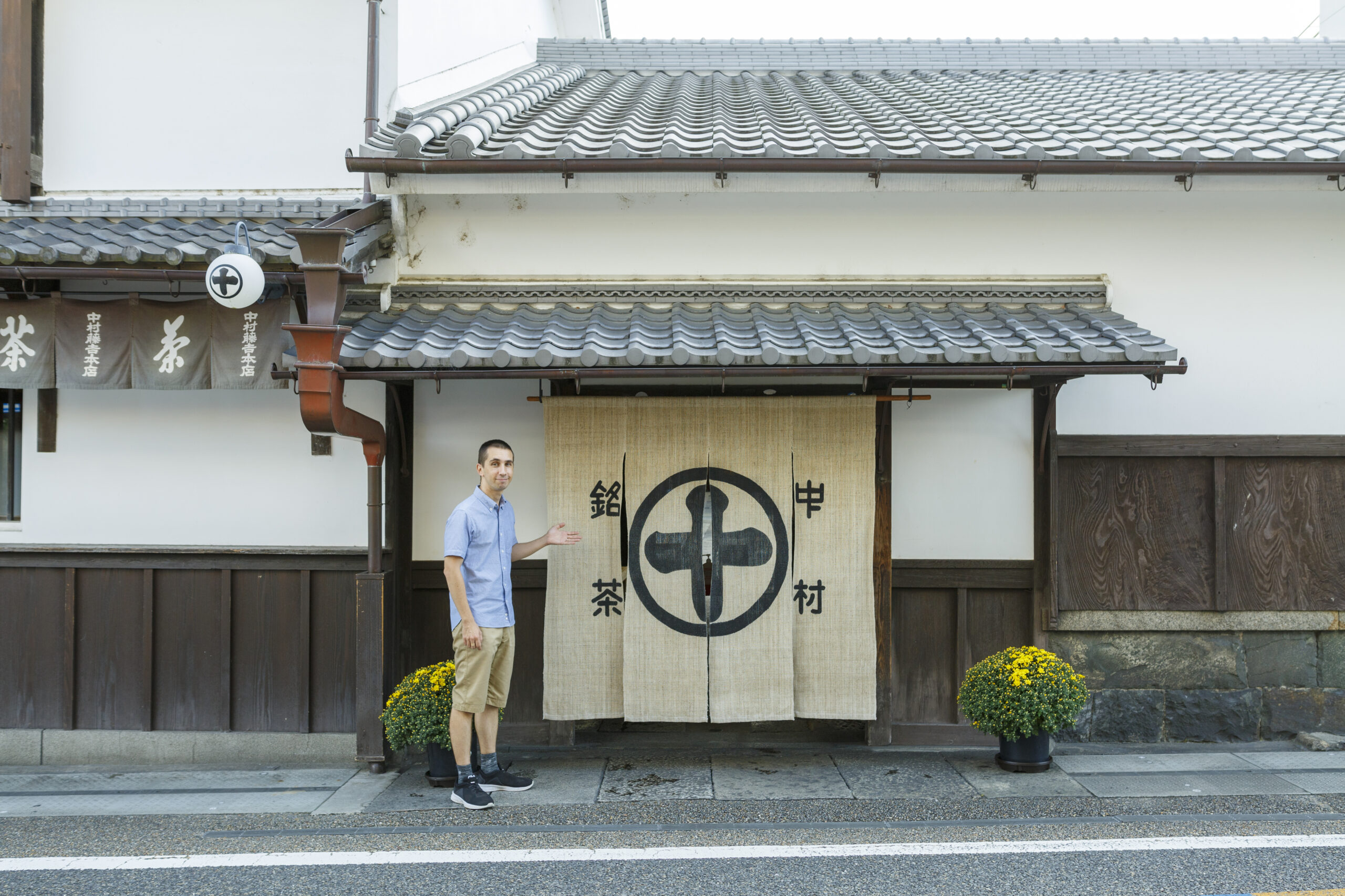
About a minute’s walk from JR Uji Station, Nakamura Tokichi Honten Main Store attracts many people from home and abroad with its authentic teas and amazing sweets. It’s a family-owned business, currently in its seventh generation, and one of the most iconic tea shops in Uji. With the traditional appeal of Uji tea, their elaborate desserts, transcending classical expectations, are loved by people of all ages.


Nakamura Tokichi Honten has been selling tea since 1854, and its historic buildings, over a century old, tell the story of its long history. A passage leads from the entrance to the back, where two rows of stone pavements remain. These were laid for carts once carrying tea leaves, and you’ll pass through this passage to reach the cafe. Inside the shop, you’ll find a haikenmado (viewing window), once used to discern the delicate colors and quality of tea with natural sunlight. This charming shop offers a selection of high-quality Uji teas, sweets made with authentic tea, and more. These make perfect gifts for yourself and your loved ones, filled with your memories of Kyoto.
The cafe is a magnificently renovated old tea factory. Aged wooden pillars remain, and the beams crisscross the ceiling. The high ceiling, designed to prevent heat accumulation during tea production, is a reminder of its long history.
You will be greeted with seasonal tea as a welcome drink here. This can be a palate cleanser before enjoying delicious sweets and dishes, calming down your excited feelings and gently turning your attention to the pleasures that lie ahead.
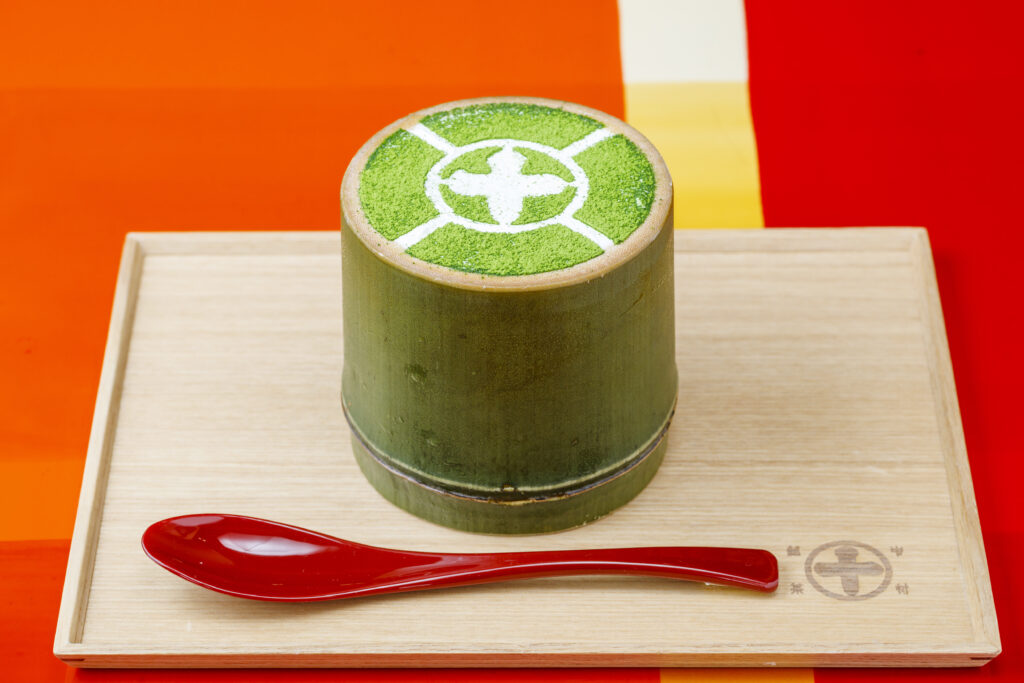
Their menu features a variety of tea-based sweets, and one of the most popular options is the Maruto Parfait [Matcha] (1,850 yen). This dessert is beautifully presented. At the Honten (Main Store), it’s served in a genuine bamboo vessel. The enchanting layers are topped with fine matcha powder, and Nakamura Tokichi Honten’s trademark makes this a photogenic feast for the eyes. Inside, you’ll find special cream, crunchy genmai (brown rice) puffs, matcha ice cream, and delightful surprises that you’ll discover with each bite!
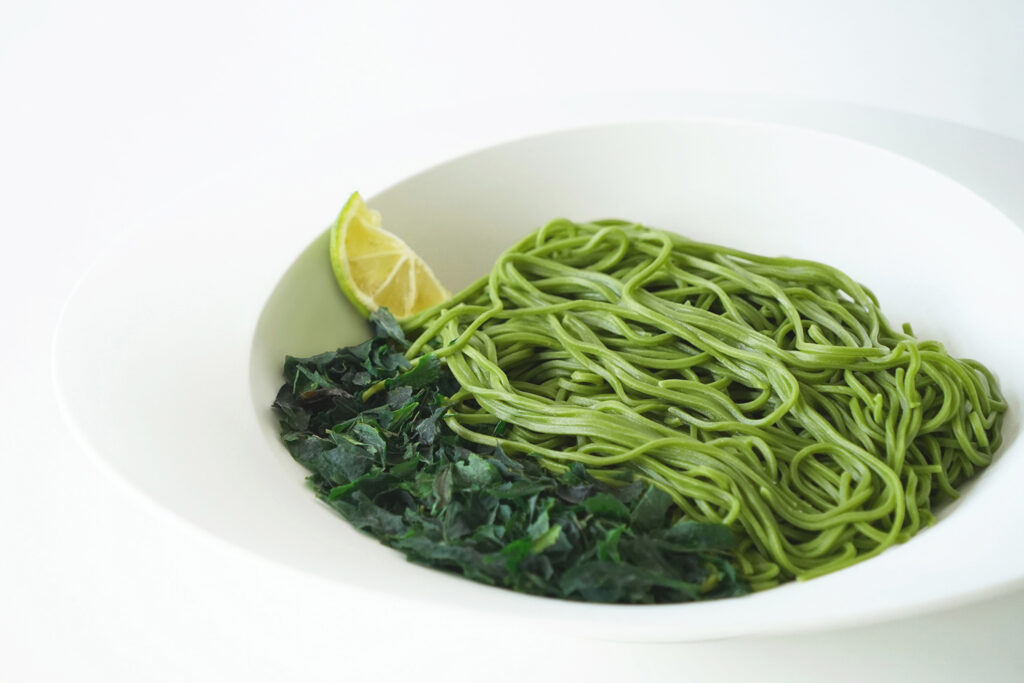
Furthermore, their lunch, other desserts, and drinks are all very enticing. The cafe hours are from 10:00am to 5:30pm. Please note that the last reception is 4:00pm. Last orders are at 4:30pm, and last orders for soba noodles are at 3:00pm.
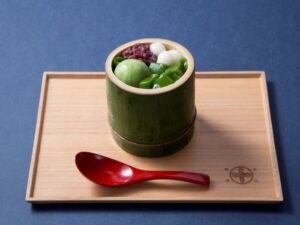
Nakamura Tokichi Honten Main Store
Nakamura Tokichi Honten was founded in 1854. With over 170 years of history, it is currently run by the seventh generation of the family. Today, it is especially famous for its delicious sweets using …
・Fukujuen Uji Kobo: Hands-On Tea Processing Experience
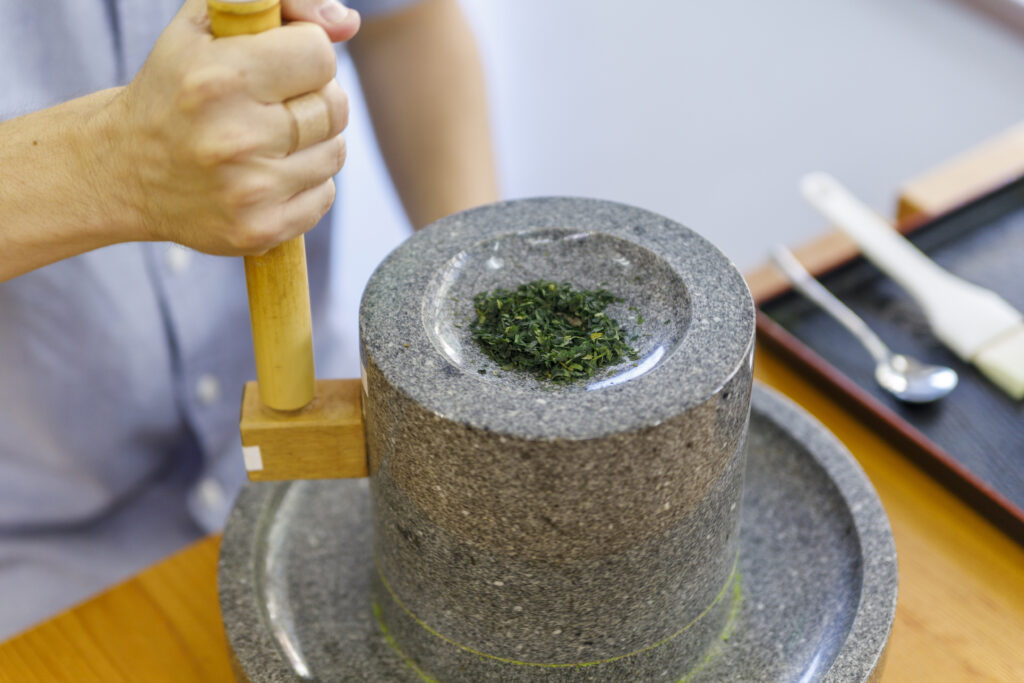
From the nature-rich Wazuka to the tea places in Uji, we’ve seen how tea makes its journey from plantations to a delicious drink and food. However, there is a crucial step in the middle, tea processing, which deserves attention. Let’s go to the eastern bank of the Uji River, and visit Fukujuen Uji Kobo’s Ujicha Kobo that was renovated in 2019. Fukujuen has a history of more than 230 years, and is known for their delicious tea. There, you can grind tea leaves into fresh matcha powder with a traditional stone mill, whisk it with hot water, and savor your own matcha. An experienced instructor will teach you one by one. It’s a simple process, but an enlightening experience that actually shows you that drinking matcha means consuming the whole tea leaves.


Tea contains various components, including catechins that are said to be antioxidants. Drinking matcha, like eating the entire leaves, makes it easier to take in nutrients like vitamin A that don’t dissolve in water.
This matcha-making experience can sometimes accept walk-ins (if there is sufficient capacity), but making a reservation beforehand is recommended. It is available daily, except on closed days (non-scheduled holidays), from 10:00am with the last admission at 3:00pm, and lasts about 40 minutes. 1,650 yen per person, including the material costs and tax.
This matcha-making experience is the most popular workshop in Ujicha Kobo, and they offer many other fun activities to deepen your understanding of tea manufacturing processes.
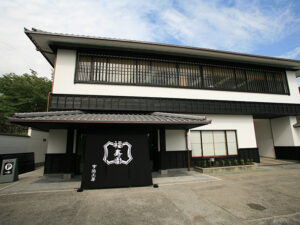
Matcha Making with a Stone Mill (Ujicha Kobo of Fukujuen Uji Kobo)
Discover the art of matcha green tea. Try your hand at rotating a stone mill, grinding tea leaves called tencha into fine matcha powder that is used in tea ceremonies. Then, whisk your own matcha and …
・Asahiyaki: Discovering the World of Pottery
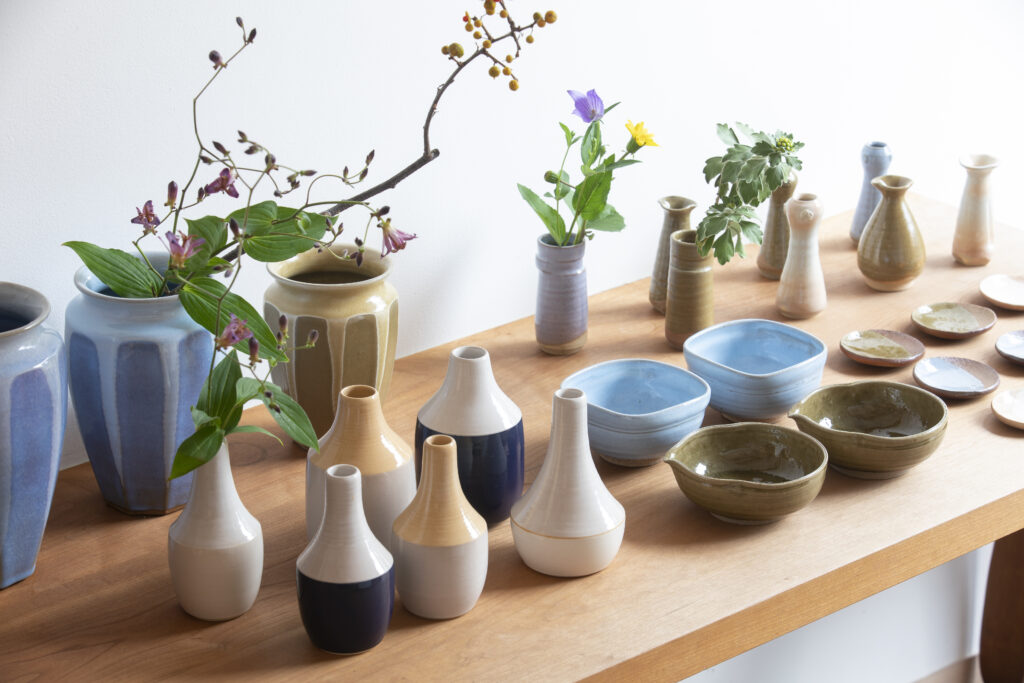
Considering the tea-drinking experience holistically, cups and teapots are essential in creating an atmosphere where tea can be fully savored.
A trip to Uji is the perfect opportunity to bring home special ceramics to enhance your future tea experiences. You can find teaware at various stores in Uji. And Asahiyaki, the renowned family-run pottery originating in Uji, is a must-visit. (It is located on the east bank of the Uji River.) It has a history of over 400 years and has been run by 16 generations. Their works are crafted from clay dug up from the ground of Uji over 50 years ago and slowly “aged.”
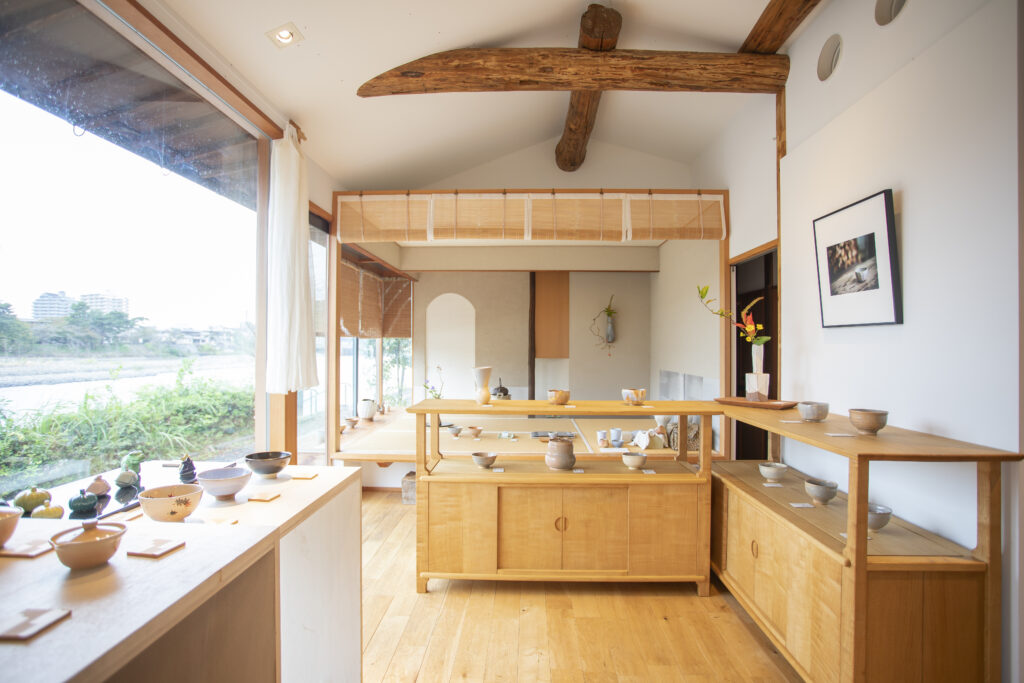
Entering Asahiyaki Shop & Gallery is a step into a world of refinement and elegance. The works on display will instantly draw you in, with the muted colors and intriguing textures inviting you to explore their details. Each of the pieces, created in the nearby atelier, is more than just a piece of pottery. Each embodies the land of Uji and the rich tea heritage. If you find a work that resonates with you, it will become a one-of-a-kind treasure.
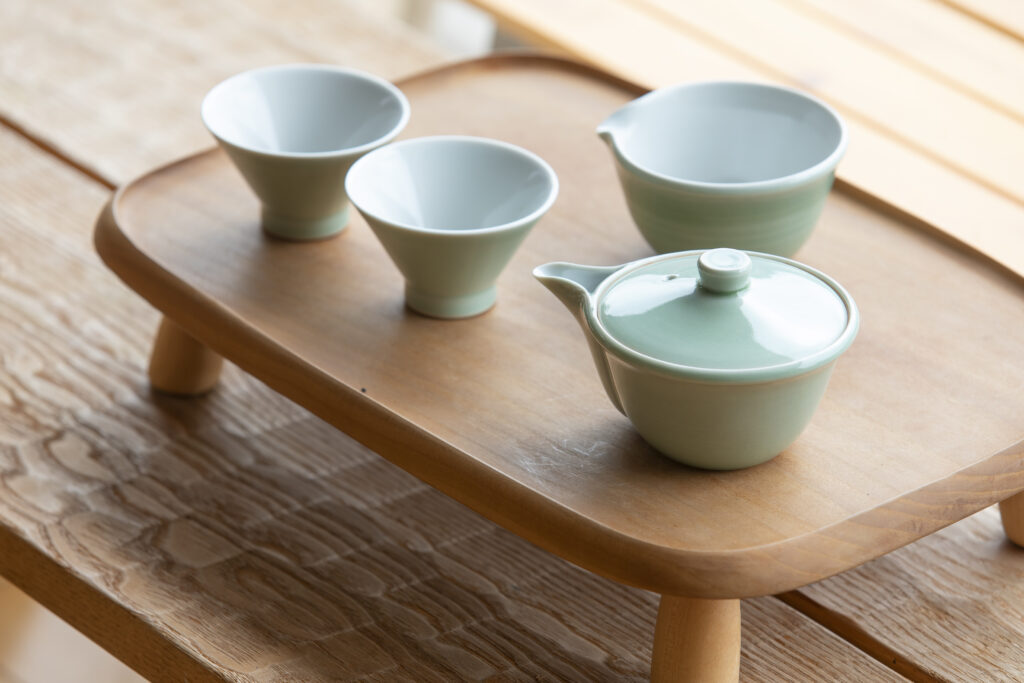
The works by the current head potter are likely to delight even serious collectors. At the same time, affordable options are on display, such as palm-sized teacups and plates with a rustic charm. The delicate design of their kyusu (small teapots mainly used for brewing Japanese tea) is very beautiful. The tea set including the kyusu is one of the famous works of Asahiyaki. A handleless kyusu, often called Hohin (treasure teapot) in Japan, is perfect for appreciating a sophisticated tea experience.
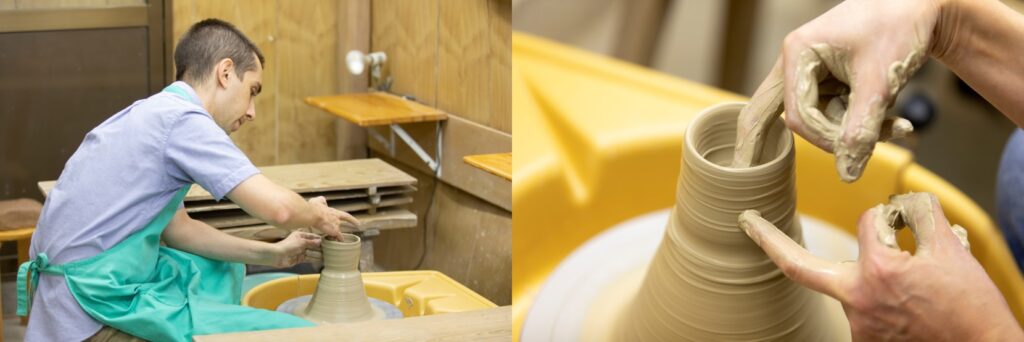

For a more in-depth look at the Asahiyaki process, join one of the Asahiyaki Pottery Classes. This is a fantastic opportunity to enter the building where a large nobori-gama (kiln with stepped chambers) is located, get hands-on experience of the traditional craft and create your own piece in its distinctive soft pink and gray tones. Here’s a glimpse of what awaits you:
-Pottery’s wheel experience: 5,500 yen (one piece); 6,600 yen (two pieces); 7,700 yen (three pieces)
-Slab building experience: 4,950 yen (one piece)
-Painting experience: 4,400 yen (plate); 6,600 yen (teacup); 17,600 yen (teabowl)
Reservations are required for pottery experiences.
International shipping requires additional fees.

Asahiyaki
Asahiyaki is a pottery that has thrived with the tea culture of Uji since its establishment in 1600. Passed down through 16 generations for over 400 years, it has a rich history. Conveniently located …
